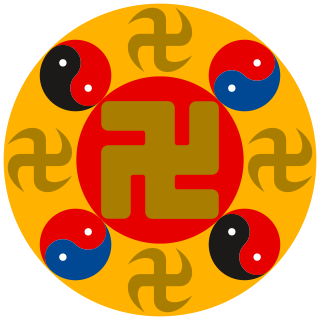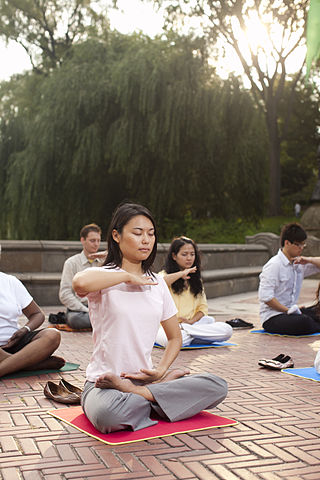Related Research Articles

Falun Gong or Falun Dafa is a new religious movement. Falun Gong was founded by its leader Li Hongzhi in China in the early 1990s. Falun Gong has its global headquarters in Dragon Springs, a 427-acre (1.73 km2) compound in Deerpark, New York, United States, near the residence of Li Hongzhi.
Li Hongzhi is a Chinese religious leader. He is the founder and leader of Falun Gong, or Falun Dafa, a United States-based new religious movement. Li began his public teachings of Falun Gong on 13 May 1992 in Changchun, and subsequently gave lectures and taught Falun Gong exercises across China.

The Epoch Times is a far-right international multi-language newspaper and media company affiliated with the Falun Gong new religious movement. The newspaper, based in New York City, is part of the Epoch Media Group, which also operates New Tang Dynasty (NTD) Television. The Epoch Times has websites in 35 countries but is blocked in mainland China.

The 610 Office was a security agency in the People's Republic of China. Named for the date of its creation on June 10, 1999, it was established for the purpose of coordinating and implementing the persecution of Falun Gong. The 610 Office was the implementation arm of the Central Leading Group on Dealing with the Falun Gong (CLGDF), also known as the Central Leading Group on Dealing with Heretical Religions, a leading small group of the Chinese Communist Party (CCP). Because it was a CCP-led office with no formal legal mandate, it is sometimes described as an extralegal organisation.

Falun Gong, also called Falun Dafa, is a spiritual practice and system of beliefs that combines the practice of meditation with the moral philosophy articulated by its leader and founder, Li Hongzhi. It emerged on the public radar in the Spring of 1992 in the northeastern Chinese city of Changchun, and was classified as a system of qigong identifying with the Buddhist tradition. Li claimed to have both supernatural powers like the ability to prevent illness, as well having eternal youth and promised that others can attain supernatural powers and eternal youth by following his teachings. Falun Gong initially enjoyed official sanction and support from Chinese government agencies, and the practice grew quickly on account of the simplicity of its exercise movements, impact on health, the absence of fees or formal membership, and moral and philosophical teachings.
Falun Gong, a new religious movement that combines meditation with the moral philosophy articulated by founder Li Hongzhi, first began spreading widely in China in 1992. Li's first lectures outside mainland China took place in Paris in 1995. At the invitation of the Chinese ambassador to France, he lectured on his teachings and practice methods to the embassy staff and others. From that time on, Li gave lectures in other major cities in Europe, Asia, Oceania, and North America. He has resided permanently in the United States since 1998. Falun Gong is now practiced in some 70 countries worldwide, and the teachings have been translated to over 40 languages. The international Falun Gong community is estimated to number in the hundreds of thousands, though participation estimates are imprecise on account of a lack of formal membership.
Li Hongzhi published the Teachings of Falun Gong in Changchun, China in 1992. They cover a wide range of topics ranging from spiritual, scientific and moral to metaphysical.
The Tiananmen Square self-immolation incident took place in Tiananmen Square in central Beijing, on the eve of Chinese New Year on 23 January 2001. There is controversy over the incident; Chinese government sources say that five members of Falun Gong, a new religious movement that is banned in mainland China, set themselves on fire in the square. Falun Gong sources disputed the accuracy of these portrayals, and claimed that their teachings explicitly forbid violence or suicide. Some journalists have claimed that the self-immolations were staged.
Zhong Gong (中功) is a spiritual movement based on qigong founded in 1987 by Zhang Hongbao. The full name (中华养生益智功) translates to "China Health Care and Wisdom Enhancement Practice." The system distinguished itself from other forms of qigong by its strong emphasis on commercialisation, and a targeted strategy that aimed to build a national commercial organisation in China in the 1990s.

James R. Lewis was an American philosophy professor at Wuhan University. He was a religious studies scholar, sociologist of religion, and writer, who specialized in the academic study of new religious movements, astrology, and New Age.

The Kilgour–Matas report is a 2006/2007 investigative report into allegations of live organ harvesting in China conducted by Canadian MP David Kilgour and human rights lawyer David Matas. The report was requested by the Coalition to Investigate the Persecution of Falun Gong (CIPFG) after allegations emerged that Falun Gong practitioners were secretly having their organs removed against their will at Sujiatun Thrombosis Hospital. The report, based on circumstantial evidence, concluded that "there has been, and continues today to be, large-scale organ seizures from unwilling Falun Gong practitioners." China has consistently denied the allegations.

The persecution of Falun Gong is the campaign initiated in 1999 by the Chinese Communist Party (CCP) to eliminate the spiritual practice of Falun Gong in China, maintaining a doctrine of state atheism. It is characterized by a multifaceted propaganda campaign, a program of enforced ideological conversion and re-education and reportedly a variety of extralegal coercive measures such as arbitrary arrests, forced labor and physical torture, sometimes resulting in death.
Zhang Baosheng was a Chinese qigong grandmaster during the peak of qigong's popularity in China. Along with Yan Xin, he played a key role in bringing qigong into the Chinese public consciousness.
Qigong, the Chinese practice of aligning breath, movement, and awareness for exercise, healing, and martial arts training, has a history that extends back more than 4,000 years. Contemporary qigong is a complex accretion of the ancient Chinese meditative practice xingqi or "circulating qi" and the gymnastic breathing exercise daoyin or "guiding and pulling", with roots in the I Ching and occult arts; philosophical traditions of Confucianism, Taoism, and Buddhism, traditional Chinese medicine and martial arts; along with influences of contemporary concepts of health, science, meditation, and exercise.
Zouhuorumo, also known as qigong deviation, is a Chinese-culture concept traditionally used to indicate that something has gone wrong in spiritual or martial arts training. The qigong community uses this term to describe a physiological or psychological disorder believed to result during or after qigong practice, due to "improper practice" of qigong and other self-cultivation techniques. The concept was highlighted in the social and political context of mass popularization of qigong in China. The Buddhist or Taoist community also uses this term when referring to people who practice esoteric techniques or meditation without the proper guidance of a teacher.
Heterodox teaching is a concept in the law of the People's Republic of China (PRC) and its administration regarding new religious movements and their suppression. Also translated as 'cults' or 'evil religions', "heterodox teachings" are defined in Chinese law as organizations and religious movements that either fraudulently use religion to carry out other illegal activities, deify their leaders, spread "superstition" to confuse or deceive the public, or "disturb the social order" by harming people's lives or property. What exactly these definitions mean has been interpreted in various ways since their establishment in 1999/2000. Organizations that are found by local police forces in the PRC to be distributing heterodox teachings are targeted for disruption, and its leaders and organizers are severely prosecuted.

The Religion of Falun Gong is a 2012 nonfiction book by Benjamin Penny, published by the University of Chicago Press, that discusses the Falun Gong's belief system.
Revenge of the Forbidden City: The Suppression of the Falungong in China, 1999-2005 is a 2009 book by James W. Tong, published by Oxford University Press. It describes how the Chinese government suppressed the Falun Gong in that stated time frame. David Ownby of the Université de Montréal described it as "a very nuts-and-bolts book".
Qigong Fever: Body, Science, and Utopia in China is a 2007 book by David A. Palmer, published by Columbia University Press. It is about the "Qigong fever" in the late 20th century in China.
Falun Gong: The End of Days is a book by Maria Hsia Chang about the Falun Gong.
References
- Mickler, Michael L. (2010). "Review: Falun Gong and the Future of China, by David Ownby". Nova Religio . 14 (2): 117–118. doi:10.1525/nr.2010.14.2.117. JSTOR 10.1525/nr.2010.14.2.117.
- Pacey, Scott (2009). "Falun Gong and the Future of China. David Ownby". The China Journal . 62. Canberra, A.C.T.: 157–159. doi:10.1086/tcj.62.20648131.
- You, Hong (2011). "Ownby, David. Falun Gong and the Future of China. New York: Oxford University Press, 2008. xi+291 pp. $29.95 (cloth)". The Journal of Religion . 91 (4): 591–592. doi:10.1086/662413.
Notes
- 1 2 Pacey, p. 157.
- 1 2 3 Mickler, p. 118.
- 1 2 Pacey, p. 158.
- ↑ Pacey, p. 158-159.
- 1 2 Kahn, Joseph (22 August 2008). "Book Review | 'Falun Gong and the Future of China', by David Ownby" . The New York Times . ISSN 0362-4331 . Retrieved 14 March 2019.
- 1 2 You, p. 591.
- ↑ Pacey, p. 159.
- 1 2 You, p. 592.